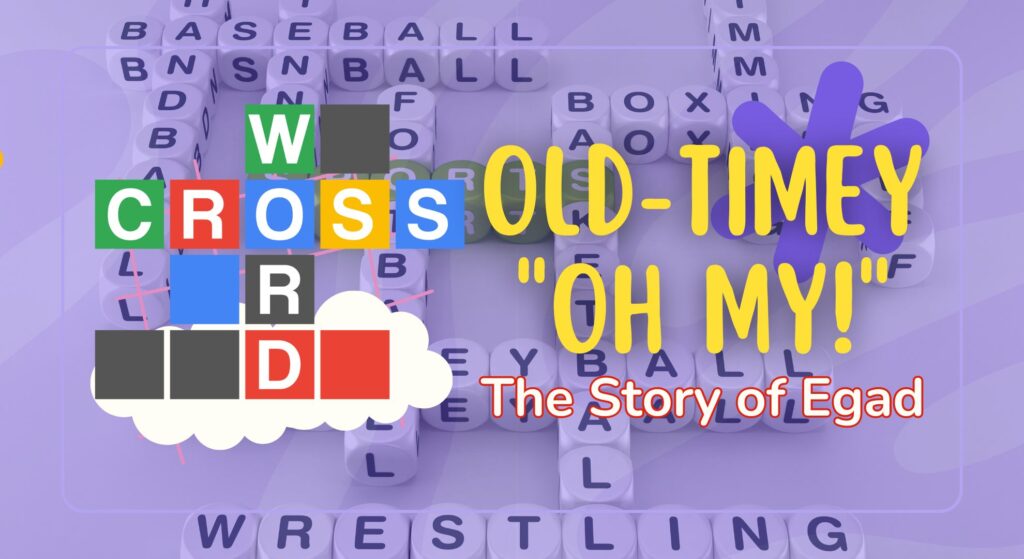Introduction
Language is always evolving, but some expressions stick with us, even when they feel old-fashioned. One such word is “Egad!”, an exclamation that was once common in English-speaking countries. It was used to express surprise, shock, or amazement. Though rarely heard today, “Egad!” captures the charm of old-timey expressions that were colorful and lively. This article dives into the history of the word, its usage, and why it has nearly disappeared from modern speech.
Where Did “Egad!” Come From?
The word “Egad!” originated in the 17th century. It’s a softened form of the phrase “Oh God!” People in the past used to avoid saying God’s name directly in casual or frustrated expressions. To prevent sounding disrespectful, they altered the phrase to “Egad!” This was a common practice during that time, with other words like “Gadzooks!” and “Zounds!” emerging from similar origins. All these words became a way for people to express surprise or frustration without directly invoking God’s name, which was considered improper.
How Was “Egad!” Used?
In old times, “Egad!” was used in much the same way we use “Wow!” or “Oh my!” today. For example, someone might say, “Egad! I didn’t see that coming!” It was a quick, catchy way to show surprise. This word often popped up in literature, plays, and everyday conversations. In particular, it appeared in the works of playwrights like William Congreve and Oliver Goldsmith. Characters in their plays would use “Egad!” during moments of astonishment or disbelief. The word added a bit of flair to conversations and made scenes feel more dramatic.
Why Did “Egad!” Fall Out of Use?
Language changes with time, and many words fall out of favor as new slang or expressions take their place. “Egad!” was popular during the 17th and 18th centuries but started fading in the 19th century. As society modernized, people’s ways of speaking shifted. The word began to feel old-fashioned and formal, especially as new forms of entertainment like movies and radio influenced speech. By the 20th century, expressions like “Oh my!” and “Wow!” became more popular, and “Egad!” became a relic of the past.
Are There Other Words Like “Egad!”?
Yes, there are several old-timey exclamations similar to “Egad!” that have also faded from use. For example:
- “Gadzooks!” – Another softened version of “God’s hooks,” referring to the nails used in the crucifixion.
- “Zounds!” – Short for “God’s wounds,” which referred to the wounds Christ received during the crucifixion.
- “By Jove!” – An expression referencing the Roman god Jove, used to express surprise or agreement.
These words, like “Egad!,” were once very common but are now rarely heard in everyday conversations.
How Did “Egad!” Appear in Pop Culture?
Although “Egad!” is no longer a part of modern slang, it occasionally appears in books, films, and TV shows to add a vintage or humorous touch. In old detective novels, particularly those set in historical settings, characters might exclaim “Egad!” to highlight their shock or surprise. It also shows up in cartoons, where over-the-top characters use it to exaggerate their reactions. Using such words can create a sense of nostalgia or humor by reminding audiences of a time when language was more formal and expressive.
Can We Bring Back “Egad!”?
While “Egad!” isn’t a word we use daily, there’s something fun about bringing back old expressions. Some vintage phrases have seen a revival in recent years, especially among people who enjoy retro or historical trends. Whether you use it to surprise your friends or add flair to your writing, “Egad!” is a lighthearted way to connect with the past. Although it may not make a full comeback, reviving forgotten words can make our language richer and more interesting.
Pros and Cons of Using “Egad!” in Modern Language
| Pros | Cons |
|---|---|
| Adds a sense of fun and surprise | May confuse people who aren’t familiar |
| Connects with historical language | Feels outdated or overly formal |
| Great for retro or vintage settings | Not commonly used in casual speech |
| Can create humorous situations | Can sound overly dramatic |
Conclusion: Egad
The expression “Egad!” might feel like a relic of a bygone era, but it still has its place in language and culture. Though no longer commonly used, it serves as a reminder of how people once expressed themselves with charm and color. Its history ties us to the past, while its playful tone makes it a fun word to use today. Whether in literature, pop culture, or just for fun, “Egad!” can still surprise and delight, showing that even old words can still have power.



